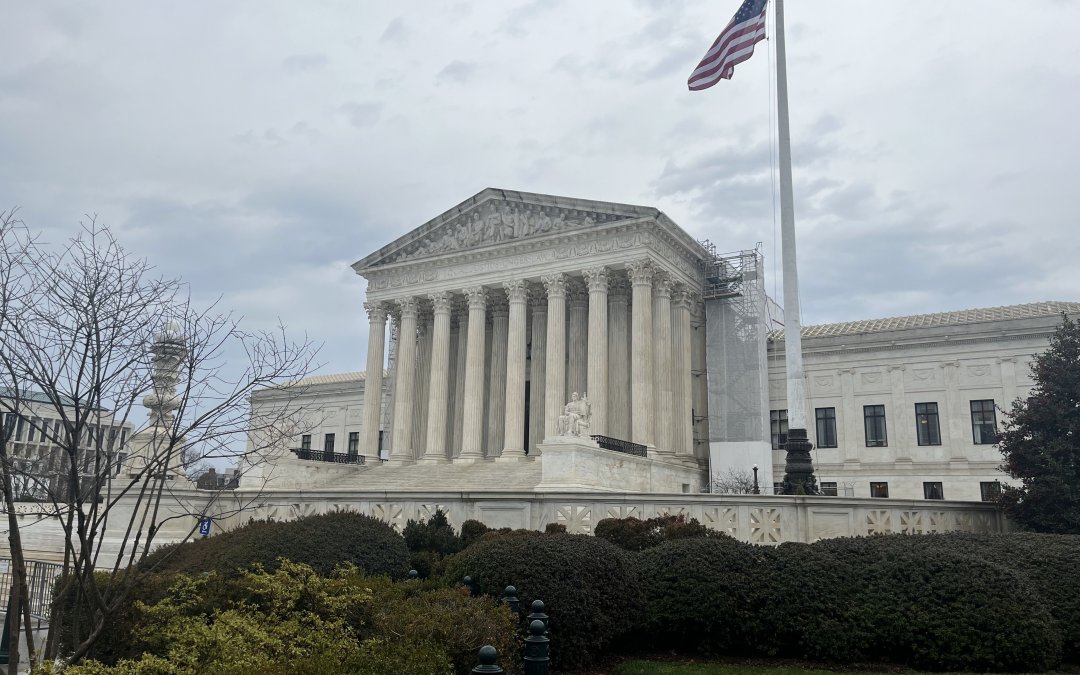WASHINGTON – Supreme Court justices expressed skepticism during oral arguments in Bouarfa v. Mayorkas on Tuesday over whether a visa petitioner can obtain judicial review for a petition initially approved and later revoked by the Department of Homeland Security.
The case was brought by the petitioner Amina Bouarfa, a U.S. citizen who filed a visa petition on behalf of her husband Ala’a Hamayel, a noncitizen and Palestinian national. Bouarfa’s petition was initially approved in 2015 but later revoked in 2017 after the U.S. Citizenship and Immigration Services (USCIS) determined Hamayel had previously entered a sham marriage to evade immigration laws, making him ineligible to become a U.S. citizen or permanent resident.
Filing an I-130 visa petition is the first step in the lengthy family-based immigration process. Over 900,000 I-130s were filed in 2023, according to the USCIS. A U.S. citizen or lawful permanent resident can file an I-130 on behalf of a noncitizen relative seeking permanent residency. An approval opens the pathway to apply for a Green Card.
Bouarfa appealed to the Board of Immigration Appeals, which upheld the decision to revoke. She then filed a suit under the Administrative Procedure Act, but the case was dismissed because the Secretary’s decision to revoke approval of a visa petition is discretionary and not subject to judicial review under a certain statute.
At the crux of Tuesday’s case was the debate on whether the government’s revocation of the visa petition was a nondiscretionary or discretionary decision, and therefore is or is not subject to judicial review.
Samir Deger-Sen, the attorney representing Bouarfa, focused his opening remarks on the mismatch of the statutes, questioning why a denied petition based on a sham marriage is reviewable but an approved petition that is later revoked because of a sham marriage is not.
Deger-Sen argued that because the revocation was on the grounds of the sham marriage determination, the decision was mandated and not at the discretion of the agency.
For the respondents, Assistant to the Solicitor General Colleen Roh Sinzdak argued that revocation decisions made by the Secretary of Homeland Security are discretionary. She cited the language of the statute itself.
“It uses the term ‘may,’ which connotes discretion,” Sinzdak said. “It uses the term ‘deems,’ which fairly exudes discretion. And it uses the capacious term ‘good and sufficient cause,’ which calls for a discretionary judgment.”
The justices grilled the attorneys on the language of the statutes but appeared to favor the government’s position, showing more skepticism toward the petitioner.
Chief Justice John Roberts expressed doubts about the basis of the petitioner’s argument in the Court. In a case of revocation, the petitioner can reapply on behalf of their relative. If that new petition is denied in the first stage, then that decision can be reviewed.
“Just apply again, and you’ll get exactly what you would have, you think you’re entitled to, which is judicial review of the decision,” Roberts said. “What more do you want?”
Deger-Sen said refiling a petition could add years of delay and emotional distress for families. Bouarfa did reapply in 2022 but is still waiting for approval.
Along with Roberts, Justices Ketanji Brown Jackson, Samuel Alito and Sonia Sotomayor questioned Deger-Sen on the implications of his argument that the revocation was nondiscretionary.
Jackson referred to his argument as “strange,” adding that it was “odd” to suggest that after approving a petition, the government would have to keep going back to see if that decision was right.
Several immigration advocacy groups weighed in on the case, filing amicus briefs supporting the petitioner.
“We’re talking about whether people are going to be able to remain in the country, become citizens, spend their lives with their spouses,” Cody Wofsy, deputy director of the ACLU’s Immigrants’ Rights Project, said. “It’s very, very important stakes. All we are saying is that these noncitizens deserve a day in court.”
The justices seemed to apply less scrutiny to Sinzdak’s argument, asking less questions and fewer justices engaging in debate. Justices Neil Gorsuch and Clarence Thomas appeared skeptical about the government’s argument that the revocation should not be subject to judicial review.
“So it’s reviewable at the beginning,” Gorsuch said. “It’s reviewable at the end. You’re just saying this one’s not reviewable in the middle?”
Thomas asked Sinzdak if she thought the discrepancy between the nondiscretionary sham marriage determination and the discretionary revocation was odd.
Sinzdak said that the statute is “a little bit odd,” but that’s just the plain text of it.
Roberts and Jackson both seemed inclined to narrow the ruling on this case. When Deger-Sen brought up the devastating impacts having to refile could have on other kinds of petitions, Roberts interrupted.
“We’ll worry about the other kinds of petitions in a case where they’re raised,” Roberts said. “It seems to me that yours is pretty straightforward.”
Jackson also brought up a potential threshold issue that both the petitioner and respondents agreed to reserve for another day.
“I will happily take the win in this case with the knowledge that in the future, I will win on this other question,” Sinzdak said.
Despite the oddities of the statutes, the Court seemed poised to affirm lower courts’ rulings and side with Mayorkas. The decision will come by the end of the Court’s term in early July 2025.


